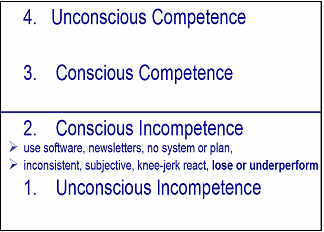Typical attributes of the Unconscious Incompetence level that we discussed last week include relying on the advice of others as the basis for making trading decisions (including brokers, the media, hot tips, chat rooms, newsletters and forums – typically referred to as ‘market noise’), and having no clearly defined and unambiguous strategy, system or trading plan for engaging the market. As a result, a very high percentage of traders and investors who embark on the active investment journey quit as losers after their first year. They bow out frustrated with the markets and with themselves and justify their actions through statements such as “the markets are rigged”, “the markets are all based on insider information” and other justifications for their inability to develop the necessary skills to achieve outperformance of the market indices.
Those who choose to persevere and to actively learn and develop the necessary skills for success will move to the next level of skills acquisition and learning, that of Conscious Incompetence. People at this level recognise and concede that they do not understand or know how to do something, This is an important step of awareness but they still do not know how to achieve competence.
At this level, in the trading arena, individuals chop and change their tools, start using technical and/or fundamental analysis software, subscribe to a newsletter or regular subscription service such as Fat Prophets or Australian Stock Report, watch stock market TV shows and experiment with different technical indicators and charting software. Because they are now paying for or paying more for their toolset and have more knowledge, they assume that they will become successful. Not so, but they have started the journey.
Their hit rate of random wins starts increasing but it is still not high enough to outweigh the loss and large loss trades and to generate a steadily rising equity curve. They are either still net losers, are profitable but still under-performing the market indices, or, at best, have outperformed but are uncertain about whether they can repeat their profitable trading. For an active investor who is putting in lots of time time, energy and effort this is unacceptable.
Their buy and sell decision making is subjective and inconsistent, using different criteria for entry into trades based on a combination of their new toolsets and the ‘noise’ of outside influences. Tips cause knee-jerk reactions and they justify their decisions based on their analysis software and newsletters. They trade this tip, let the next tip or two go, and then do the one after, each with illogical ‘gut-feel’ position sizes. They hesitate rather than act, resulting in chasing the trade and buying at a much higher price. Hesitation and reservation also cause delay in selling, resulting in eroding profits and larger loss trades than otherwise would have occurred.
In short, they lack structure, rigour and consistency in their trade selection, execution and amount of capital placed in each trade, mainly due to fear of losing or missing out.
At this level, the incompetent still thinks at the individual trade level and has not moved to the portfolio level of thinking (this topic has been discussed in earlier blog postings). They put undue significance on individual winners and/or losers, resulting in undue emotional reaction. They do not actively invest according to well organised processes that make up a well documented investment plan.
A bull market hides these inadequacies and provides a false indication of an individual’s level of incompetence which will be magnified in a bear market where large loss trades occur that wipe out portfolios. For a classic example of this, we need look no further than recent events in global equity markets. The sustained bull-run in which people of all levels of competence were able to make money came to a crashing end in late 2007. Unconscious Incompetents and Conscious Incompetents had their portfolios fall in value in line or worse than the market indices. They were to learn that their level of skill was far from adequate to consistently protect their capital and make money from the markets across a broad range of market conditions. As the old saying goes, they had mistaken a bull market for brains!

To become consistently successful in the market, the individual needs to ‘move above the line’ to acquire the level of skill that is Consciously Competent. We will delve further into this topic next week and take a look at how we begin to move to this level of competence in our trading and investing activities.



10 Responses
You have summed me up! How do you account for broker information within this “noise?” These are people whose competence is supposively unquestioned, but are they really top of the tree when many of them rely on other analysists within a company?
Summed me up too! Now looking forward to hearing where I am potentially heading when I get over the line…………
Somehow I think crossing the line will not be simple..
How to do it? Spend a few grand and buy SPA3 🙂 Unfortunately this still doesn’t guarantee success – i have been trading for 6 months and I am under performing the index in part due to a hEdge that SPA3 signalled which lost me a good 3%. However, what SPA3 has taught me is to be robotic in my buy/sell/make up your mind decisions. If I trade it long enough, that one hEdge loss will become 10 losses but perhaps sit alongside 6 wins that were much larger.
I’ve stopped looking at the broker sites, stopped worrying about how much to buy and when.. it is pretty liberating. There is still more work to do though! I see SPA3 as part of a larger picture – sometimes your money is best sitting outside the ASX! (In another market or instrument showing clearer trends for example)
I used to think the same about brokers as John – it is what they are paid to do right? I learned my hardest and most important lesson when multiple brokers had a ‘buy’ on AFG at about $5 from memory in 2007 – if multiple brokers all agreed it had to be a winner. Right? My AFG shares that I held all the way down are now worth zero. Unless you can put down in writing as per your trading plan why you are entering a trade then you should not enter. Full stop. Gut feel, tips and the need to be ‘in a trade’ will get you nowhere fast. I am past the ‘conscious incompetence’ part of the journey and working on ‘conscious competence’. It is a great journey that I know will pay off in the fullness of time and well worth the many hours dedicated to learning and development. I am not a customer of Sharefinder but I read everything that Gary writes and try to watch on Sky whenever he is on. His approach to the market is 2nd to none.
Hi Marc keep the faith the results take a while to kick in but once its up and running the money just comes in.
You have a great edge just use it as it is designed
Response to Comment by Oliver:
“Somehow I think crossing the line will not be simple.. “
Too right. Well it depends on how much baggage one has. Some are able to go straight there and wonder what all the fuss is about but for the majority it is not that simple.
Wrt the market, it’s about transitioning from a societal paradigm to a market paradigm. Transition will not just occur on its own – it requires desire, effort and commitment.
This applies to anything in life whether it be weight reduction, quitting smoking or becoming a consistently successful active investor. It requires identifying a proven process, stepping into that process and then dealing with the dysfunctional beliefs that will try to sabotage the process that you have stepped into.
Sabotage will be:
1. all kinds of negative thoughts that try to talk you out of continuing the transition process, and
2. feelings of discomfort and conflict that cause irritability, frustration and possibly even anger.
You have to energise a new set of beliefs and de-energise a set of dysfuctional beliefs.
Regards
Gary
Ralph, I believe it. I’m not reviewing my results until I’ve been trading SPA3 for at least a year. I expect (which is more than believing) that the edge will make me money over the longer term!
Garry
Some thoughts on this issue:
I agree with your analysis of becoming a mechanical traded as you express on a regular basis and agree with completly, this I see as the execution end of the business “pulling the triger if you will”.
I see it as a multi-facited chalange of mind and body against the market, that is overcoming our human weakneses, this goes to the very depths of our soul and overall wellbeing, overcoming those weaknesses and temptations as they arise is where I see the real chalange.
I believe these temptations are best expressed as the seven deadly sins, comprising: Lust, Gluttony, Greed, Sloth, Wrath, Envy and Pride, this is where the real control lies, working, attempting to overcome and keep them under control is where the real challange lies.
I will refrain from giving you examples agains each criteria with regard to trading in the market, I am sure you can do it for yourself, If you Google “seven deadly sins” you will find lots to chew on!
Regards
Allan
Although I am a beginner at trading, hopefully with my simple strategys I will be one of those who will be above the line. Be revered by all. Regards Martin